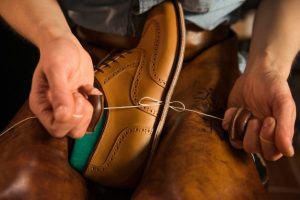How To Start A Shoemaking Business In Nigeria
How To Start a Shoemaking Business In Nigeria. Starting a shoemaking business is not difficult. All you need to know is the basics. This post aims at answering the following questions: How much does it cost to start a shoemaking business? How can I start a shoe business in Nigeria? Is shoemaking a business profitable? How do I start a shoe business from scratch?

Shoemaking Business
Items such as Shoes are essential to completing and complementing an attire. A pair of shoes is a must-have for day to day activities such as attending ceremonies or other public or private occasions, as well as attending church or school. Creating a shoe manufacturing firm might be a challenge, but it also has the potential to be quite lucrative. A lot of people are trying to get into this industry, but if you know what you’re doing and put in the hard work, you’ll be successful in it.
The financial structure of the Shoe Manufacturing business is minimal. Shoes and leather items are repaired by firms in this industry. Recently, a developing niche market for high-end shoes and more employment has led to a comeback in revenue growth. It’s a specialized market. In this way, it facilitates starting and running a firm on a low-investment basis.
Read also: How to target your audience on Instagram as a business
Cost of starting a shoemaking business
Launching a shoe shop may be expensive. The first franchise cost is around N200,000. Initial inventory might cost N150,000 – N300,000 for a small business, while grand opening promotion can cost N50,000. Many of these costs are significant due to the high cost of shoes.
Is the shoemaking business profitable?
Yes, it is a profitable enterprise. Profitable businesses are those where you can save money, obtain good clients, and have people refer you to others. The only thing left to do is to properly package your firm. How nicely you organize your items and who you’re targeting are all factors. Making N40,000-N50,000 per month is possible.
Basic shoemaking tools
1. Protective gear (Mask)
Protect yourself from dust, particulates, and pollutants by wearing a well-fitted mask or respirator. You may get a selection of masks and respirators at your nearby retail shop.
2. Utility Knife
Using a utility knife to cut leather and soling materials may be highly effective provided the blades are replaced periodically to keep them sharp. Knife-sharpening may be required for harder materials such as veg-tanned leather (for insoles) and soling. You’ll need to be careful and always trim according to the body.
3. Cutting mat
It’s possible you already have a self-healing slicing pad in your stash if you knit or craft. If you don’t have them, you can find them at most craft and sewing stores. When trimming leather or soling, the pad will prevent the area you’re working on from becoming damaged.
4. Hole Punch
When using single hole punches you will need a tool to puncture them. If you need to punch holes in a range of sizes, a rotary punch is an excellent choice. This tool may also be used in conjunction with your utility knife to create gaps for sandal buckles and button bolt holes using the hole punch and your utility knife.
5. Glueing brush
The adhesive may be applied with any standard craft or paintbrush. I usually use one with brushes that are around 1.5cm broad, but you may use whatever size you want and have on hand. Keep in mind that the adhesive might damage your brush, so select one that you won’t want to use again.
6. Sandpaper
When creating shoes, it’s helpful to have a few various grades of sandpaper on hand. You may use coarser sandpaper to soften the leather and soling for glueing, while a thinner grade works to even out the corners of your insoles and soles and give them a good touch.
Read also: How to start a food delivery business in Nigeria
Guides for Starting A Shoe Business In Nigeria
1. Decide the type of shoe business
Footwear comes in many varieties, each with a specific purpose. Your speciality will determine the sort of shoes you will produce. How professional or informal will the footwear be? for women, men or children? Finding your speciality before you start manufacturing can assist to narrow your focus and define your target audience. What shoe will appeal most to your customers?
What brands and pricing are your rivals offering? All of this is crucial to know before starting a shoe manufacturing firm. Many sorts of shoes exist, so you’ll have to pick one and build a business around it.
2. Get Trained
If you want to train in shoes, choose a decent shoe firm or a shoemaker that is skilled at what they do. It is true that there are many tutorials on shoe manufacturing on YouTube, but this is not sufficient because there are certain elements you may require when it comes to preparing for ground training. It matters where you get your training from, so be sure it’s a place that produces excellent content.
If you want to make sandals, go to a firm that makes sandals, not one that makes slippers. Design contemporary, fashionable, and up-to-date designs for today’s market. Aba is a city in Nigeria where you will find large shoe companies where you may enrol or perform an apprenticeship.
3. Branding
In order to stand out from the crowd, you need to be creative when it comes to branding. As an example, you could stamp a custom logo on all of your shoes, create a prototype that attracts the eye or package your shoes in a unique way. In addition, it’s a terrific marketing technique and a means for customers to recognize your shoes. A logo helps your consumers recognize your footwear. To develop a logo, you may use a free tool like Photoshop or hire a graphic designer to do it for you.
4. Get the Shoe Business Registered
Corporate Affairs Commission (CAC) registration is required if you want to avoid being fined by government agencies for running an unlawful shoe company in Nigeria. Kindly register your shoe business in Nigeria with the Corporate Affairs Commission (CAC) as a business, company, or Limited Liability Company.
5. Capital
To establish a small-scale shoemaking business in Nigeria, you’ll need a minimum of N100,000. Starting up a shoe business requires a large sum of money to cover the cost of the necessary equipment, raw materials for shoe production, operating costs, and other expenses.
6. Location
The shoemaking business in Nigeria doesn’t require a lot of space to get started, so you may use any spare room in your house to get started. Once you’ve made enough money to hire a larger location to develop your shoe business in Nigeria, you can. The most essential part of this company is choosing the correct location. Aside from that, you’ll also need to select a place where you can expect a lot of foot traffic from shoe-wearers.
Read also: How to start a telecommunication business (complete guide)
The best place to stay is close to the airport and business area as well as close to colleges and universities. Individuals typically search for this sort of assistance along their career paths.
7. Research
Do a little market research so that you can determine who your potential consumers are and where you want to go with your product or service. You should also keep in mind that your findings will help you decide if you want to have a shoe brand for only men, only women, or both, or if you want to have a brand for children and other sorts of shoes. It’s a topic that’s covered in a ton of books. The internet is another option to rapidly learn about shoes.
8. Purchase equipment
Get started by gathering the necessary tools and supplies. Most of these are taken care of when you train under a professional. For this reason, training is extremely crucial. Making shoes requires specialized equipment that is not universally available, so you will know precisely what you need before getting started.
When it comes to fancy shoes, leather is the most common material used. While some are constructed from rubber or plastic, others are less stylish. It all depends on what kind of shoe you want to make and who your target market is.
9. Marketing and Advertisement
Shoes are a dynamic industry that needs strong market tactics in order to remain competitive. To promote your firm, take advantage of all accessible resources. For a small firm, word-of-mouth advertising is the most cost-effective way of advertising. Customer referrals will increase if you create high-quality shoes. The only caveat is that you have to manufacture high-quality footwear.
Ads in papers, magazines, and on tv and radio are all options if you have a larger budget to work with. You may also sponsor a program that promotes your brand.
10. Produce quality shoes
When you create high-quality shoes, you’ll be able to maintain a steady stream of consumers. Aba-made shoes are used to irritate consumers. Aba currently produces high-quality shoes that are difficult to distinguish from imported ones. Those Italian shoes you picked up at the market may have been produced in Aba, you just don’t know. Shoe quality should be on par with those made in the UK and the United States.
Decide on pricing that is in line with your brand’s values. Is it more important for you to offer affordable shoes or costly ones? Be sure to include the cost of manufacturing as well as advertising.
11. Package your shoes well
You shouldn’t take this lightly, because it may make or break your company. Everything that is done in Nigeria is the same as what we do in the West, with the exception of the labelling. At a time when so many firms are getting a facelift, many business people are beginning to realize. Make an agreement with a carton manufacturer so that they can offer you stylish tiny cartons that are neatly packaged. On both the shoes and the container, be sure to imprint your brand’s name.
Conclusion
As a result of the growing popularity of Nigerian-made products, the shoe-making sector is a lucrative one. Shoemaking is an important piece of clothing that should be worn with pride. As a result, everyone will require footwear at some point in their lives. Consider learning this talent as an investment opportunity.
We Believe This Article Was Helpful, Don’t Hesitate To Share This Information With Your Friends On Facebook, Twitter, Whatsapp and Google plus.
Copyright Warning: Contents on this website may not be republished, reproduced, redistributed either in whole or in part without due permission or acknowledgement. All contents are protected by DMCA.
The content on this site is posted with good intentions. If you own this content & believe your copyright was violated or infringed, make sure you contact us via This Means to file a complaint & actions will be taken immediately.



